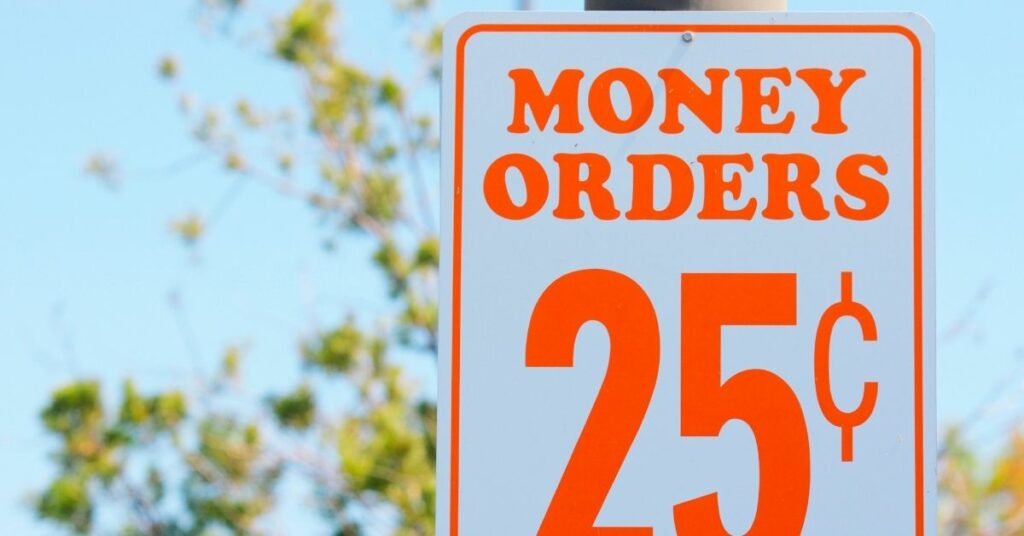
Money orders can be used as an alternative form of cash or checks. While these paper documents provide guaranteed funds, they are different from a check in the sense that they aren’t connected to a bank account. Furthermore, they work on a prepaid basis. In this blog post, we share everything you need to know about money orders, as well as answer whether money orders are a safe form of payment.
How Do Money Orders Work?
Various kinds of institutions can issue money orders, including grocery stores and post offices. Using a money order, you can pay the issuer with the amount you want to send, along with fees if there are any. You then take the fees away from the purchase account to get your money order’s face value.
Once you’ve purchased your money order, you’ll get a document similar to a check which will include the amount of payment made. In this document, you’ll need to fill out details such as the payment amount, the payee’s name, the purpose of the payment, and your name and address. The next step is to send the money order to wherever you’re paying, where the recipient of the money can deposit or cash it like you would a check.
Why Use a Money Order?
There are plenty of benefits to using a money order as an alternative form of payment to cash or personal checks. However, there are also risks associated with it, which you need to be aware of. Below are just a few examples.
Pros:
- One of the biggest benefits of using money orders as opposed to other services is that you don’t need to provide personal information such as your bank’s routing number or your account number.
- A money order can be issued in one country and then cashed in a different country.
- Money orders can be cashed through credit unions or a bank without the need to visit an issuer.
- You can also deposit a money order into a bank account with no worries about extra charges.
Cons:
- In comparison to other modes of payment, money orders are harder to track. Unfortunately, you won’t be able to tell if the order is or isn’t cashed.
- Money orders can be deceptive — don’t receive money orders from people you’re not familiar with. Fraudulent money orders can cause serious problems and you may even lose money.
- If a money order is cashed inside a bank, you may experience delays.
When You Should Use a Money Order
There are times when using a money order is more convenient or safer than issuing cash or personal checks. Here are just a few instances:
- You’re looking to send money in the mail: If you’re uncomfortable sending a check that has all your banking details, this is a good option since only the recipient will be able to cash it. It’s also a great alternative if you’re not willing to mail cash.
- You don’t want to open a bank account: Because money orders are prepaid, they don’t need you to have a checking account. Money orders allow you to receive payment and pay bills without being connected to a financial institution or bank.
- You want a sure way to pay: Your money orders are prepaid, so you can be sure that the recipient won’t complain about being unable to cash it due to insufficient funds.
Is There Security in Money Orders?
In general, money orders are safe to use as an alternative to checks or cash, because only the payee will be able to deposit or cash it in for the amount stated on the document. So long as the receipt is with you, you should be able to recover the funds if it is stolen, lost, or damaged.
However, it’s best to remember that money orders are also prone to scams. If you aren’t sure if a money order is legitimate, make sure to confirm the funds with the issuer.
Money orders serve as a great hybrid between cash and checks. Just like checks, they allow you to send money to a payee but are a prepaid document separate from any bank. This makes them as good as cash and comes without the worries of it bouncing, making it a truly great alternative to both options. If you’re looking to learn more about payment methods, check out our banking courses.
Related Articles
How To Quickly Improve Your Credit Score
Bad credit can lead to plenty of issues. It can make it difficult to get a loan, rent an apartment, or even get a job. ...
Read More
Is Debt a Sign of Failure?
Debt is a tricky topic. Some people see debt as a sign of failure, while others see it as an opportunity to invest in something ...
Read More
How To Set and Reach Financial Goals
When it comes to your finances, you would likely love to be in a much better place. But, if you’re honest with yourself, you often ...
Read More







